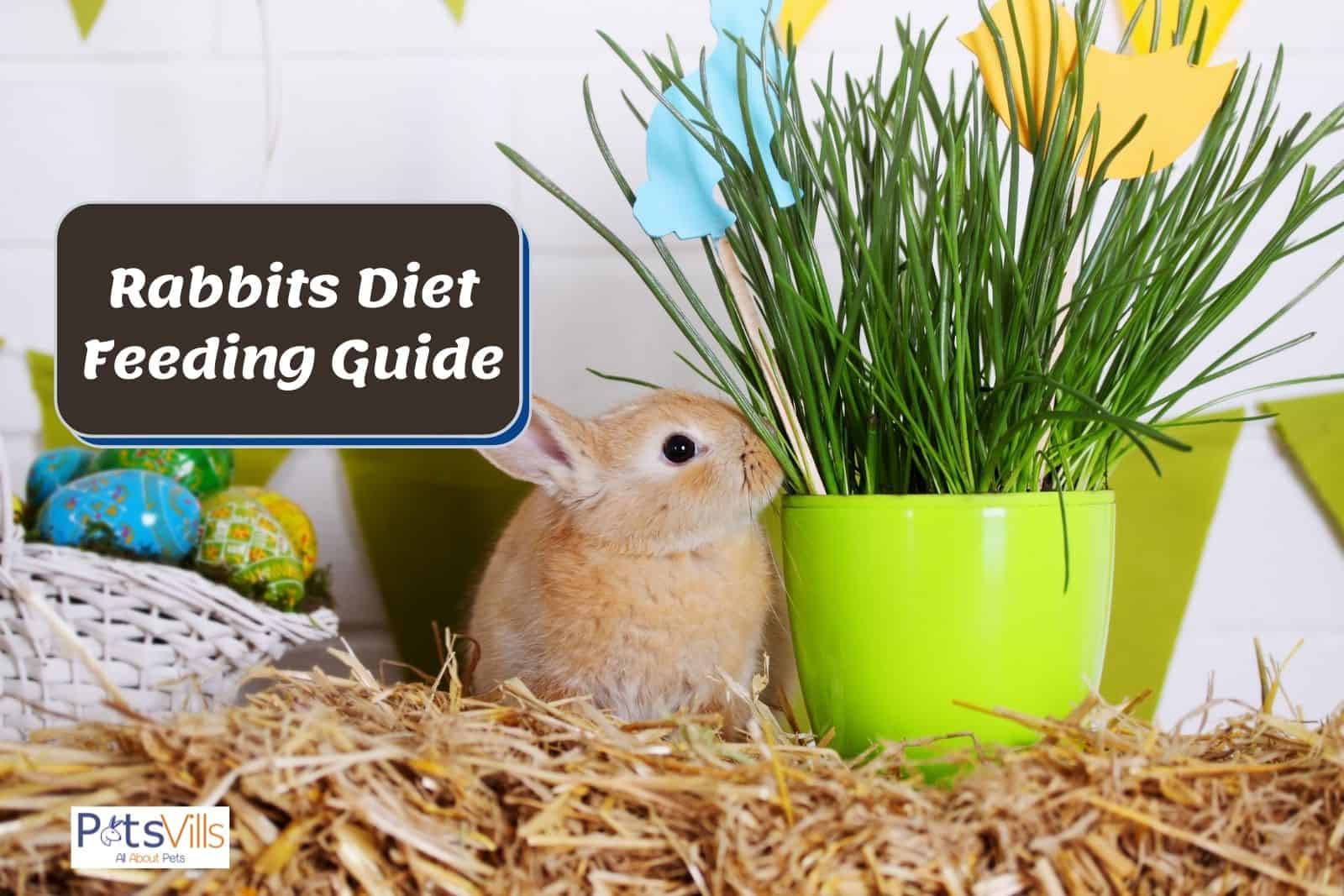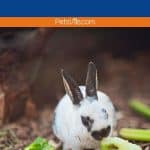Rabbits require a well-balanced diet of grass hay, leafy vegetables, and pellets to be happy and healthy.
In this article, we’ll cover what to feed rabbits or what they require daily good and bad fruits/vegetables, and unsafe foods for your pet.
This post contains affiliate links, and I will be compensated if you make a purchase after clicking on my links.
CHECK: Best Rabbit Food
Table of Contents
Rabbits Daily Diet
Rabbits are herbivores [1] and require a mixture of foods each day to keep them healthy.
Your rabbit’s main diet (80% to 90%) should consist of high-quality grass hay, such as Timothy hay or meadow hay.
Grass hay provides your rabbit with fiber and keeps its digestive system working efficiently.
Hay also helps wear down your rabbit’s teeth.
Grass hay should always be available to your rabbits as they constantly need to munch on it.
Hay is something you should never run out of when you own a rabbit!
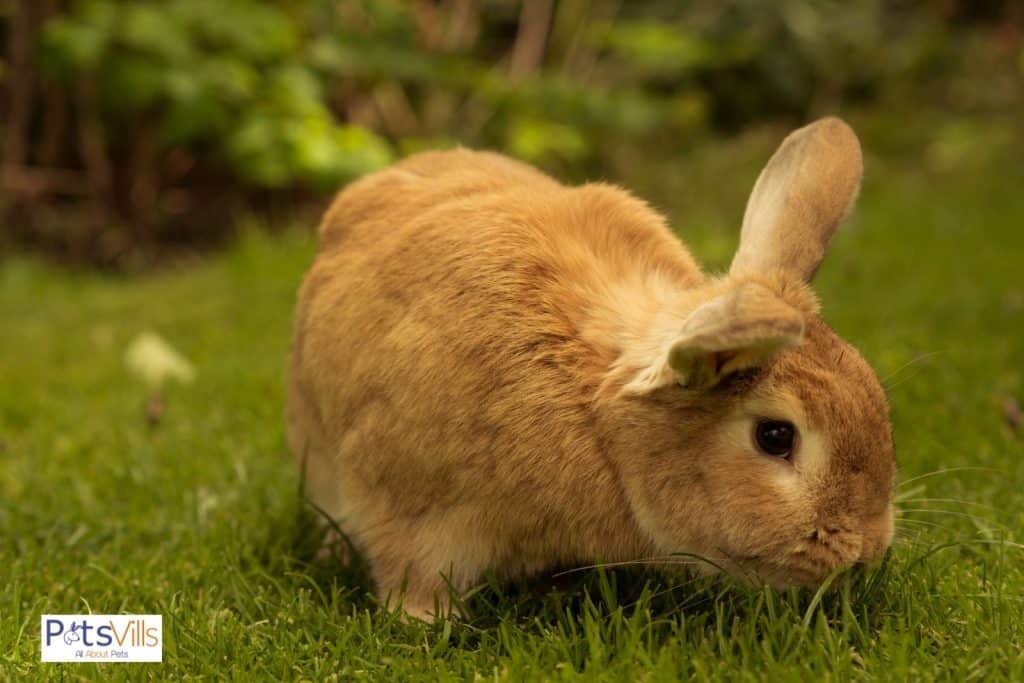
Make sure you change your rabbit’s hay each day, even if they haven’t eaten all of it. It would be best if you didn’t let your rabbit consume stale or dirty hay.
In addition to hay, your rabbit also needs good-quality rabbit pellets and leafy greens each day.
It’s important not to only feed your rabbit pellets as it can cause several health problems [3]. vestwest.com has put together a list of health problems that can occur when you only feed your rabbit pellets.
Only feed your rabbit a small portion of pellets/nuggets each day, as they should not be the main component of your rabbit’s diet.
Around ¼ (25 grams) cup of pellets per 6 lbs of your rabbit’s body weight is a good portion size.
It would help if you avoided rabbit muesli at all costs. Most commercial rabbit mueslis are high in fat and are not nutritious for your pet [2].
They also typically contain unhealthy and unnecessary ingredients like seeds, grains, and flaked maize. These can be harmful to your rabbit.
Most rabbit mueslis cause digestive and dental issues, so it is best to avoid them.
Watch this video for additional information on rabbit’s diet.
Leafy Green Vegetables And Portion Sizes
Your rabbit also needs a generous portion of leafy green vegetables every day, as well as grass, hay, and pellets.
Around 2 cups of leafy green vegetables per 6 lbs of your rabbit’s body weight are ideal.
You should offer a good variety of leafy green vegetables (around 5 to 6 different types) and rotate them regularly.
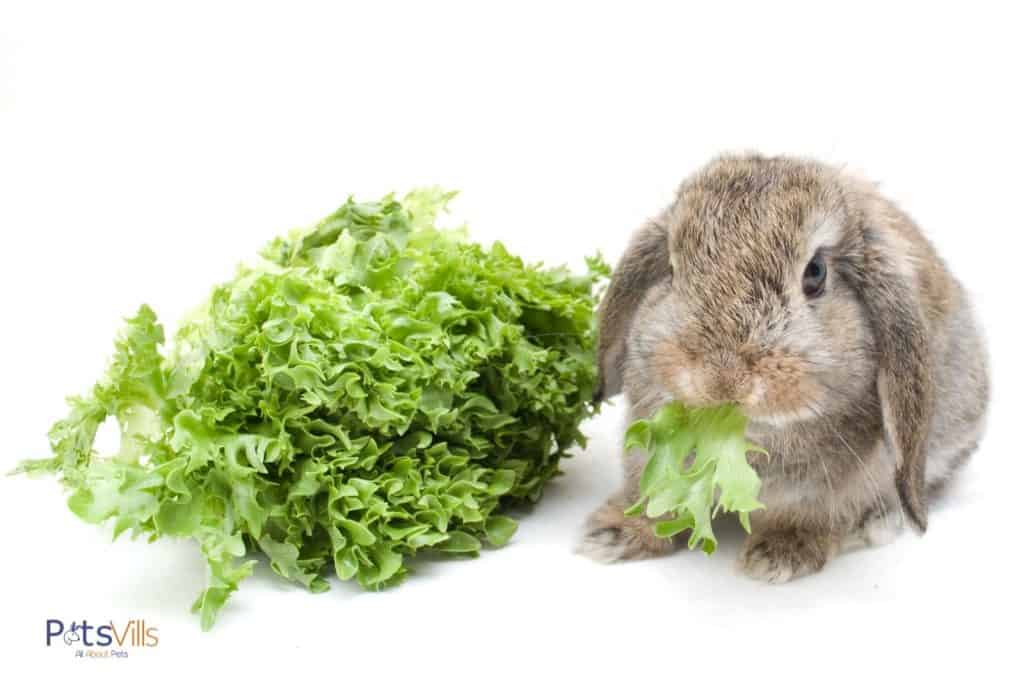
You should aim to feed your rabbit twice a day. Once in the morning and once in the evening.
However, stick to portion sizes and don’t double them. For example, if your rabbit weighs 6 lbs, feed them 1 cup of leafy greens and 12.5g of pellets in the morning and then the same amount in the evening.
Do rabbits drink water? Yes, your rabbit also requires freshwater every day. You should change your rabbit’s water every day to stop it from becoming dirty or stale.
Never use water collected from puddles, streams, rivers, pools, etc. Water collected from these sources can contain chemicals and other harmful pollutants to rabbits.
Only use bottled, tap, or filtered water for your rabbit.
What Are Good Treats for Rabbits?
Treats are great for training and bonding with your rabbit, but they should be fed in moderation.
Store-bought treats can contain a lot of sugar, fat, and calories, so they should only be given to your rabbit every once in a while.
The best treats for rabbits are fruits and vegetables.
There are much healthier and more nutritious than store-bought treats.
Carrots are a good treat for rabbits as they are natural and nutritious.
Most rabbits adore the taste of carrots, which makes them ideal for training.
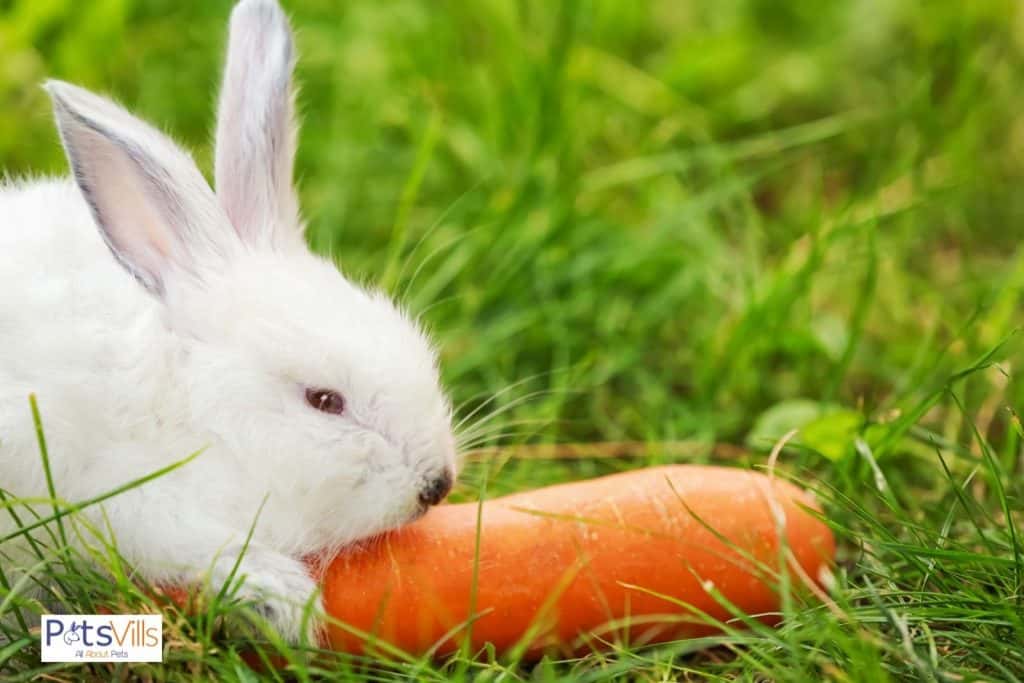
Additionally, fruits, such as strawberries and apples, are delicious and healthy treats for rabbits.
However, fruits and root vegetables are naturally high in sugar, so they should not be fed too often. A couple of slices once or twice a week is more than enough for your rabbit.
If you plan on feeding your rabbit store-bought treats, opt for natural ones that don’t use artificial colors, flavors, or preservatives.
Do Rabbits Need Chew Toys?
Your rabbit’s teeth are constantly growing, which means they need access to chew toys.
Chew toys are vital for your rabbit’s dental health [4]. Gnawing on chew toys, wear your rabbit’s teeth down to prevent them from becoming too long.
If your rabbit is not given chew toys to nibble on, then its teeth will become too long. Overgrown teeth are extremely uncomfortable, painful, and often need veterinary treatment.
Here are some of the best chew toys available for your rabbit to keep their teeth healthy!
#1 William Craft Timothy Hay Sticks
These Timothy hay sticks from William Craft are ideal for your rabbit’s dental health.
They’re made from Timothy grass powder to make them a delicious and healthy snack for your rabbit.
Timothy hay is high in fiber, making it effective at keeping your rabbit’s teeth healthy and worn down.
The hard texture of these sticks makes them great at filing down your rabbit’s teeth to stop them from becoming overly long.
No pesticides are used in these sticks, so they are perfectly safe for your rabbit. Your rabbit will enjoy munching on these sticks, which is a great boredom breaker.
These sticks are also suitable for other small animals, such as guinea pigs.
#2 Niteangel Willow Mega Munch Sticks For Small Animals
These willow sticks by Niteangel are excellent for wearing down your rabbit’s teeth.
They are made from organic and natural willow branches. They are also environmentally friendly!
The length of sticks is 10.5 inches long, which means they are plenty big enough for your rabbit to nibble on.
These willow sticks are also suitable for other animals, such as guinea pigs and hamsters.
#3 Niteangel Small Animal Activity Toy
These activity balls from Niteangel are effective for wearing down your rabbit’s teeth.
They are made from 100% natural materials and are crafted without metal, plastic, and glue. This makes them perfectly safe for your pet to nibble on.
These balls are made from different (pet-safe) materials, including cornhusk, seagrass, and rattan.
This gives your rabbit plenty of chewing options to pick from! These chew toys can also be used for other small animals.
What Fruits Can Rabbits Eat?
Fruits are a healthy and tasty snack for your rabbit, but they should be fed in moderation.
Fruits are high in sugar, which is unhealthy for your rabbit when fed too often. Too much sugar in your rabbit’s diet can lead to health issues, such as obesity.
You should feed your rabbits fruits around once or twice a week and only in small quantities.
Safe Fruits For Rabbits
Here is a list of fruits that are safe for your rabbit.
- Blueberries
- Raspberries
- Pears (remove seeds)
- Banana
- Apricot (remove pit)
- Strawberries
- Apple (remove seeds)
- Cherries (remove pits)
- Blackberries
- Peach (remove pit)
- Plum (remove pit)
- Orange (remove seeds)
- Tangerines (remove seeds)
- Satsumas (remove seeds)
- Tomatoes (not green sections)
- Watermelon (remove seeds)
- Cranberries
- Grapes (seedless)
- Kiwi fruit
- Mango
- Pineapple
Fruits You Shouldn’t Feed Your Rabbit
Here is a list of fruits you shouldn’t feed your rabbit.
- Tomato leaves/stalks (the fruit is fine, but the green parts are toxic)
- Most citrus fruits (oranges, satsumas, etc. are fine, but other citrus fruits like lemons are too sour and acidic)
What Vegetables Can Rabbits Eat?
Rabbits require around 2 cups of leafy green vegetables (per 6 lbs of body weight) each day.
Some vegetables should be fed in moderation, such as spinach and carrots, while others can be fed more regularly (like celery).
Make sure you offer your rabbit 4 to 6 different types of leafy greens. You should also rotate them regularly enough to provide your rabbit with a wide range of nutrients.
Safe Vegetables For Your Rabbit
Here is a list of vegetables for rabbits.
- Parsley
- Swiss chard
- Bok Choy
- Carrots
- Broccoli
- Celery
- Kale
- Cucumber
- Collard Greens
- Lettuce (dark colored varieties – Iceberg should be avoided!)
- Turnips
- Watercress
- Zucchini
- Mint
- Mustard greens
- Cauliflower
- Rocket/arugula
- Pumpkin
- Squash
- Radish tops
- Green beans
- Peas
- Chicory
- Asparagus
- Brussel sprouts
- Fennel
- Beetroot (use caution with the tops)
- Baby sweetcorn (not full-size ones!)
- Fennel
- Dill
- Celeriac
- Artichoke leaves
- Eggplant
Vegetables Your Rabbit Shouldn’t Eat
Even though rabbits are herbivores, it doesn’t mean every vegetable is good for them.
Here is a list of vegetables rabbits shouldn’t eat.
- Potatoes (including sweet potatoes)
- Avocado
- Rhubarb
- Onion (all varieties)
- Leeks
- Chives
- Iceberg lettuce/light-colored lettuces
- Cabbage (can cause gas and stomach upsets in big quantities, so best to avoid!)
How Much Fruit And Vegetables Should I Feed My Rabbit?
You should feed fruits to your rabbit in moderation. A couple of slices once or twice a week is plenty for your pet to enjoy.
On the other hand, Leafy green vegetables should be fed daily to your rabbit. Around 2 cups per 6 lbs of your rabbit’s body weight is an adequate amount.
Make sure you offer your rabbit a good variety of leafy greens vegetables (around 5 to 6 different types). You should also rotate them regularly.
However, it is essential to note that some leafy green vegetables should not be fed as frequently as others.
For example, spinach should only be fed a few times a week as it contains a lot of oxalates.
Celery is a leafy green vegetable that can be included daily in your rabbit’s diet.
What Other Household Foods And Drinks Can Rabbits Consume?
There are very few household foods, and drinks rabbits can consume other than fruits, vegetables, and clean water.
Can Rabbits Eat Cheese?
No, rabbits cannot eat cheese. Dairy products are unhealthy for rabbits and are difficult for them to digest.
Can Rabbits Eat Bread?
Rabbits can eat bread, but it does mean they should. The bread offers no nutritional benefit to your rabbit, and there are much healthier treats to feed them (like fruits and veggies).
Bread also contains a lot of starch, which is hard for your rabbit to digest. If your rabbit cannot digest something, it will ferment in your rabbit’s intestines and lead to health issues.
Can Rabbits Eat Meat?
No, rabbits cannot eat meat. Rabbits are herbivores, which means they do not need any form of meat in their diet.
Rabbits cannot digest meat, and it offers no nutritional value to your pet. In other words, don’t feed meat to your rabbit!
Can Rabbits Eat Brazil Nuts?
No, rabbits cannot eat brazil nuts. All types of nuts should not be fed to rabbits.
Nuts contain a lot of fat and are hard for rabbits to digest, leading to health issues.
Can Rabbits Drink Milk?
No, rabbits cannot drink milk. Rabbits are unable to digest lactose and dairy products.
Rabbit’s Diet-Related Health Problems
There are various health problems your rabbit can suffer from due to a poor or unbalanced diet.
That’s why your rabbit’s diet must be as healthy and nutritious as possible.
If your rabbit consumes too many sugary and fatty foods (like store-bought treats and fruits), then they are more likely to become obese.
Obesity in rabbits can lead to many complications, such as heart disease and hepatic lipidosis. That’s why you should limit how much fat and sugar your rabbit eats.
Additionally, if your rabbit does not consume enough fiber or hay, it can develop GI stasis.
GI stasis can also occur when rabbits have too much fat/carbs in their diet, aren’t getting enough exercise, and are stressed.
GI or gut stasis is when your rabbit’s digestive system slows down and stops functioning normally. When this happens, harmful bacteria build up in your rabbit’s intestines.
GI stasis is a severe condition that can be fatal in extreme cases or left untreated.
Symptoms of GI stasis are:
- Bloating
- Lethargy
- Loss of appetite or reluctance to eat
- Small/oddly-shaped feces
- Inability to pass feces
If you notice your rabbit displaying any of these signs, then take them to a vet as soon as possible to get them checked out.
FAQs:
Can rabbits eat cooked fruits and vegetables?
Rabbits do not digest cooked foods very well, so you should always feed fruits and vegetables raw. Cooked fruits and vegetables also have fewer nutrients.
Will hay make my rabbit fat?
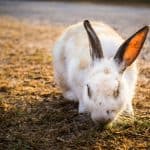
Hay will not make your rabbit fat. Regular hay (not alfalfa) has very low nutritional value. Rabbits need hay to wear down their teeth and keep their digestive tract moving.
Can rabbits eat eggs?
You should not feed your rabbits eggs as they can cause digestive issues. Rabbits cannot process dairy products, which includes eggs.
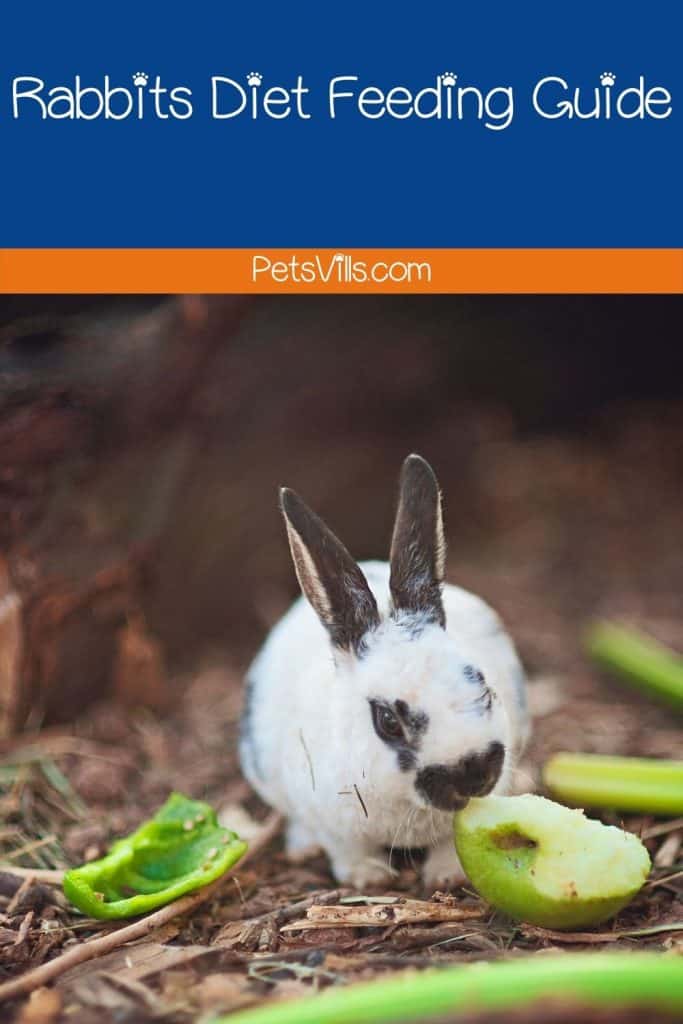
What do you normally feed your rabbits? Let us know in the comments below.
References
- 1. Bradford A. Rabbits: Habits, Diet & Other Facts [Internet]. Live Science. Live Science; 2017. Available from: https://www.livescience.com/28162-rabbits.html
- 2. Welfare of rabbits: the need for a suitable diet | nidirect [Internet]. www.nidirect.gov.uk. 2015. Available from: https://www.nidirect.gov.uk/articles/welfare-rabbits-need-suitable-diet
- 3. Disorders and Diseases of Rabbits – All Other Pets [Internet]. Veterinary Manual. Available from: https://www.msdvetmanual.com/all-other-pets/rabbits/disorders-and-diseases-of-rabbits
- 4. Rabbit Dental Care 101 [Internet]. www.petmd.com. [cited 2022 Feb 1]. Available from: https://www.petmd.com/rabbit/general-health/rabbit-dental-care-101
Alina Hartley is a small-town girl with a ginormous love of bearded dragons. It all started with Winchester, a baby bearded who was abandoned at the shelter by his former owners because of a birth defect that caused one front leg to be shorter than the other. Alina originally went to the shelter looking for a guinea pig, but one look at Winchester and it was love at first sight. From that day on, Alina has dedicated her life to learning everything she can about bearded dragons. She loves helping new beardie parents start their incredible journey with these magnificent reptiles.
Follow her on:
LINKEDIN
TWITTER.
Read her latest articles HERE
Learn more about her HERE.

